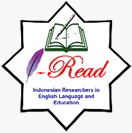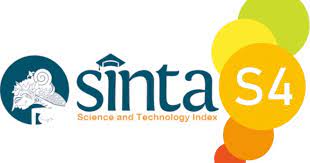An investigation of the use of information and communication technology in secondary schools: Teachers’ voices
DOI:
https://doi.org/10.22219/englie.v5i1.30357Keywords:
ICT, EFL, Challenges, Teachers, PerspectiveAbstract
Despite the fact that there has been a lot of research on online learning and the use of technology, researchers have paid very little attention to the use of information and communication technology after the COVID-19 pandemic, particularly on the perceptions of teachers who teach at the middle and high school levels. As a result, this study aims to analyze teacher perspectives on the use of technology, information, and communication, particularly in English subjects. A mixed methods technique will be applied in this investigation. To acquire a deeper understanding of middle and high school teachers' impressions of using ICT in English language learning, researchers utilize quantitative data from surveys and qualitative data from free-form writing. First, the questionnaire will be distributed to teachers using the Snowball method. After all the data from the questionnaire is received, the researcher will distribute some questions concerning the challenges, suggestions, and teachers' opinions on using ICT in English classes to obtain more in-depth information. The findings of this study show that teachers have a positive attitude toward using ICT, particularly in the teaching and learning process. One of the most important considerations is that incorporating technology into the teaching and learning process may improve the classroom atmosphere and engage students in the teaching and learning process. Future studies can explore teachers' perceptions using qualitative methods so that the data obtained will be deeper and can enrich the knowledge related to ICT use after the COVID-19 pandemic.
Downloads
References
Abduh, M. Y. M. (2021). Full-time online assessment during COVID -19 lockdown: EFL teachers’ perceptions. Asian EFL Journal, 28(11).
Adedoyin, O. B., & Soykan, E. (2020). Covid-19 pandemic and online learning: The challenges and opportunities. Interactive Learning Environments. https://doi.org/10.1080/10494820.2020.1813180
Akbulut, Y., Odabaşi, H. F., & Kuzu, A. (2011). Perceptions of preservice teachers regarding the integration of information and communication technologies in Turkish education faculties. Turkish Online Journal of Educational Technology, 10(3).
Alhuwaydi, A. A. (2021). Teachers’ perceptions of challenges in online teaching: A survey across universities in KSA. TESOL International Journal, 16(3.1).
Alkamel, M., & Chouthaiwale, S. S. (2018). The use of ICT tools in English language teaching and learning: A literature review. Veda’s Journal of English Language and Literature-JOELL, 5(2).
Aniq, L. N., & Drajati, N. A. (2019). Investigating EFL teachers’ perceptions on their TPACK development: How EFL teachers view seven domains on TPACK framework. Leksika: Jurnal Bahasa, Sastra dan Pengajarannya, 13(2), 95-101.
Apriani, E. (2017). Utilizing preservice English teachers strategies and classroom management at junior high school in Rejang Lebong regency. ENGLISH FRANCA : Academic Journal of English Language and Education, 1(2). https://doi.org/10.29240/ef.v1i2.291
Ashraf, M. A., Tsegay, S. M., & Meijia, Y. (2021). Blended learning for diverse classrooms: Qualitative experimental study with in-service teachers. SAGE Open, 11(3). https://doi.org/10.1177/21582440211030623
Ashton, P. T. (2014). Historical overview and theoretical perspectives of research on teachers’ beliefs. International Handbook of Research on Teachers’ Beliefs. https://doi.org/10.4324/9780203108437-9
Balol, N. (2023). How the use of ICT encourages the students collaborative learning. International Journal of Linguistics, Literature and Translation, 6(2), 42-49.
Bailey, D., Almusharraf, N., & Hatcher, R. (2021). Finding satisfaction: Intrinsic motivation for synchronous and asynchronous communication in the online language learning context. Education and Information Technologies, 26(3). 2563–2583. https://doi.org/10.1007/s10639-020-10369-z
Bhattarai, L. N. (2021). Students’ Perception on ICT Integrated Mathematics Classes. Interdisciplinary Research in Education, 5(1–2). https://doi.org/10.3126/ire.v5i1-2.34732
Bhaumik, R., & Priyadarshini, A. (2020). E-readiness of senior secondary school learners to online learning transition amid COVID-19 lockdown. Asian Journal of Distance Education, 15(1). https://doi.org/10.5281/ZENODO.3891822
Burden, K., & Shea, J. (2013). ICT and assessment. In M. Leask & N. Pachler (Eds.), Learning to teach using ICT in the secondary school: A companion to school experience (pp. 161–173). New York, NY: Routledge.
Çakıcı, D. (2016). The use of ICT in teaching English as a foreign language. TESOL Quarterly, Special Issue (4).
Caponetto, I., Earp, J., & Ott, M. (2014). Gamification and education: A literature review. Proceedings of the European Conference on Games-Based Learning, 150-57
Chakma, U., Li, B., & Kabuhung, G. (2021). Creating online metacognitive spaces: Graduate research writing during the covid-19 pandemic. Issues in Educational Research, 31(1). https://www.iier.org.au/iier31/chakma.pdf
Creswell, J. W. (2013). Steps in conducting a scholarly mixed methods study: What I am looking for core characteristics: Do you have a quantitative database? (closed‐ ended). University of Nebraska - Lincoln. https://digitalcommons.unl.edu/cgi/viewcontent.cgi?article=1047&context=dberspeakers
Garrison, D. R., & Vaughan, N. D. (2012). Blended Learning in Higher Education: Framework, Principles, and Guidelines. Blended Learning in Higher Education: Framework, Principles, and Guidelines. https://doi.org/10.1002/9781118269558
Ghavifekr, S., Kunjappan, T., Ramasamy, L., & Anthony, A. (2016). Teaching and learning with ICT tools: Issues and challenges from teachers' perceptions. Malaysian Online Journal of Educational Technology, 4(2), 38-57
Hashemi, A. (2021). Online teaching experiences in higher education institutions of Afghanistan during the COVID-19 outbreak: Challenges and opportunities. Cogent Arts and Humanities, 8(1). https://doi.org/10.1080/23311983.2021.1947008
Hashemi, A., Si Na, K., Noori, A. Q., & Orfan, S. N. (2022). Gender differences on the acceptance and barriers of ICT use in English language learning: Students’ perspectives. Cogent Arts and Humanities, 9(1). https://doi.org/10.1080/23311983.2022.2085381
Hossain, M. M. (2021). English language teaching through virtual classroom during COVID-19 lockdown in Bangladesh: challenges and propositions. Journal of English Education and Teaching, 5(1), 41-60.
Kew, S. N., & Tasir, Z. (2022). Learning analytics in online learning environment: A systematic review on the focuses and the types of student-related analytics data. Technology, Knowledge and Learning, 27(2). https://doi.org/10.1007/s10758-021-09541-2
Khafaga, A. F., & Shaalan, I. E. N. A. W. (2021). Mobile learning perception in the context of COVID-19: An empirical study of Saudi EFL majors. Asian EFL Journal, 28(13).
Khan, Shakeel Ahmad; Bhatti, Rubina; and Ahmad Khan, Aqeel. (2011) Use of ICT by Students: A Survey of Faculty of Education at IUB. Library Philosophy and Practice. https://digitalcommons.unl.edu/libphilprac/677
König, J., Jäger-Biela, D. J., & Glutsch, N. (2020). Adapting to online teaching during COVID-19 school closure: teacher education and teacher competence effects among early career teachers in Germany. European Journal of Teacher Education, 43(4). https://doi.org/10.1080/02619768.2020.1809650
Kuzembayeva, G., Taganova, A. M., Spulber, D., & Maydangalieva, Z. (2022). Teachers’ perspectives on using information and communication technology in the secondary school practice: A case study. Journal of Social Studies Education Research, 13(3).
Li, B. (2022). Ready for online? Exploring EFL teachers’ ICT acceptance and ICT literacy during COVID-19 in Mainland China. Journal of Educational Computing Research, 60(1). 196-219. https://doi.org/10.1177/07356331211028934
Lukas, M. (2014). Supporting friendly atmosphere in a classroom by technology implementation. Challenges in Building Child Friendly Communities: Proceedings of International Conference. Zadaar, Croatia.
Mansour, N. (2008). The experiences and personal religious beliefs of Egyptian science teachers as a framework for understanding the shaping and reshaping of their beliefs and practices about Science-Technology-Society (STS). International Journal of Science Education, 30(12). 1605-1634. https://doi.org/10.1080/09500690701463303
Naylor, D., & Nyanjom, J. (2021). Educators’ emotions involved in the transition to online teaching in higher education. Higher Education Research and Development, 40(6). 1236-1250. https://doi.org/10.1080/07294360.2020.1811645
Nguyen, L. T. H. (2021). Teachers’ perception of ICT integration in English language teaching at Vietnamese tertiary level. European Journal of Contemporary Education, 10(3). 697-710. https://doi.org/10.13187/ejced.2021.3.697
Octaberlina, L. R., & Muslimin, A. I. (2020). EFL students perspective towards online learning barriers and alternatives using moodle/google classroom during Covid-19 Pandemic. International Journal of Higher Education, 9(6). 1-9. https://doi.org/10.5430/ijhe.v9n6p1
Öztürk, M. (2021). Asynchronous online learning experiences of students in pandemic process: Facilities, challenges, suggestions. Turkish Online Journal of Qualitative Inquiry. 17 (2). 173-200 https://doi.org/10.17569/tojqi.767378
Prensky, M. (2005). Listen to the natives. Educational leadership. Educational leadership: journal of the Department of Supervision and Curriculum Development, 63(4):8-13.
Rigo, F., & Mikus, J. (2021). Asynchronous and synchronous distance learning of English as a Foreign Language. Media Literacy and Academic Research, 4(1). 89-106.
Saputra, D. B., Ayudhia, H. Y., & Muswari, R. (2022). Teachers’ perceptions of challenges in online learning: Voices from secondary EFL teachers. JOALL (Journal of Applied Linguistics and Literature), 7(1). 104-118. https://doi.org/10.33369/joall.v7i1.18855
Schleicher, A. (2020) The impact of Covid-19 on education: Insights from education at a glance 2020. https://www.oecd.org/education/the-impact-of-covid-19-on-education-insights-education-at-a-glance-2020.pdf
Schoepp, K. (2005). Barriers to technology integration in a technology-rich environment. Learning and Teaching in Higher Education: Gulf Perspectives, 2(1). 56-79 https://doi.org/10.18538/lthe.v2.n1.02
Shukri, A., Nordin, L., Salleh, F. I. M., Raidzwan, S. N. M., & Ahmad, R. (2020). UniKL students’ perception on synchronous learning using ICT as learning tools to learn english. Journal of Critical Reviews, 7(8). 793-796. https://doi.org/10.31838/jcr.07.08.170
Siddiquah, A., & Salim, Z. (2017). The ICT facilities, skills, usage, and the problems faced by the students of higher education. Eurasia Journal of Mathematics, Science and Technology Education, 13(8). 4987-4994. https://doi.org/10.12973/eurasia.2017.00977a
Tomczyk, Ł., Potyrała, K., Demeshkant, N., & Czerwiec, K. (2021, June). University teachers and crisis e-learning: results of a Polish pilot study on: attitudes towards e-learning, experiences with e-learning and anticipation of using e-learning solutions after the pandemic. In 2021 16th Iberian Conference on Information Systems and Technologies (CISTI) (pp. 1-6). IEEE.
Tsegay, S. M. (2015). Students’ experience in student-centered learning at higher education institutions in China: A case study. International Journal for Educational Studies, 7(2). 135-146.
UNESCO. (2020). Half of world’s student population not attending school: Launches global coalition to accelerate deployment of remote learning solutions. https://en.unesco.org/ news/half-worlds-student-population-not-attending-school-unesco-launches-globalcoalition-accelerate
Vooget, J., Knezek, G., Cox, M., Knezek, D., & Ten Brummelhuis, A. (2013). Under which conditions does ICT have a positive effect on teaching and learning? A Call to Action. Journal of Computer Assisted Learning, 29(1). 1-11. https://doi.org/10.1111/j.1365-2729.2011.00453.x
Yandell, J. (2020). Learning under Lockdown: English teaching in the time of Covid-19. Changing English, 27(3), 262-269.
Downloads
Published
How to Cite
Issue
Section
License
Copyright (c) 2024 Saputra et al

This work is licensed under a Creative Commons Attribution-ShareAlike 4.0 International License.
Authors who publish with English Learning Innovation (englie) agree to the following terms:
- For all articles published in English Learning Innovation (englie), copyright is retained by the authors. Authors give permission to the publisher to announce the work with conditions. When the manuscript is accepted for publication, the authors agree to automatic transfer of the publishing right to the publisher.
- Authors retain copyright and grant the journal right of first publication with the work simultaneously licensed under a Creative Commons Attribution-ShareAlike 4.0 International License that allows others to share the work with an acknowledgement of the work's authorship and initial publication in this journal.
- Authors are able to enter into separate, additional contractual arrangements for the non-exclusive distribution of the journal's published version of the work (e.g., post it to an institutional repository or publish it in a book), with an acknowledgment of its initial publication in this journal.
- Authors are permitted and encouraged to post their work online (e.g., in institutional repositories or on their website) prior to and during the submission process, as it can lead to productive exchanges, as well as earlier and greater citation of published work (See The Effect of Open Access).
This work is licensed under a Creative Commons Attribution-ShareAlike 4.0 International License.
















1.png)












